- Home
- Anne Easter Smith
A Rose for the Crown: A Novel Page 7
A Rose for the Crown: A Novel Read online
Page 7
Will tactfully stopped playing as Kate picked up the casket and touched the carving with her fingers, her expression radiant. Anne lifted the fabric from her gift and gazed on a rosewood harp with a figure cunningly wrought in the neck. Reverently she put out her hand to touch the dark wood and the lovely figurehead carved on the neck. Kate put down her gift to finger the harp also. Anne clapped her hands in delight and put her arms around her father’s waist, murmuring her thanks into his doublet. Kate, too, hovered behind Anne to thank him.
Will was approaching the table, admiration for the craftsmanship of the harp written on his face.
“I see I chose well, harper.” Richard’s bright blue eyes were merry.
“Master, mine seems but a toy by its side,” Will acknowledged and turned to look at Kate, who was once again stroking the instrument. “I beg you to allow my pupil to show you what she has learned.” He smiled at Anne.
Anne shook her head vehemently, blushed to the roots of her hair and sat down quietly. Richard frowned, disappointed. Seeing his displeasure, she pushed the harp towards Kate. “You play it, Kate,” she stammered. “Kate plays much better than I do, doesn’t she Will?”
Will inclined his head in assent. “’Tis true, Master Haute. Mistress Kate has been quick to learn.” He hoped he had been diplomatic where Anne was concerned.
Kate looked at Richard questioningly and without needing any more encouragement than a nod from him, picked up the instrument. Checking to make sure that it was tuned, she sat down on Will’s stool and ran her fingers over the strings. The sound floated through the hall, giving her courage to open her mouth and sing.
“Lollay, lollay, little child
Why weepest thou so sore . . .”
Her voice had purity, clarity and sweetness. It rose and fell, her interpretation of the song capturing the imagination of every listener in the hall. Even Elinor listened, grudgingly. Richard’s mouth curved into a satisfied smile, while Martin sat riveted to his chair. He knew at once he wanted this young woman in his life. Perhaps she would be a suitable match for young George. He resolved to find out Kate’s lineage. He presumed she was Richard’s ward and as so might come with a handsome dowry.
THE CHRISTMAS SEASON was fast approaching. It was time to ask Richard’s permission to journey back to the farm to make good on her promise to be there for the birth of her mother’s new child. Kate wondered where the time had gone. Anne was sad at the thought of not sharing the festivities of the season together. She envied Kate’s happiness when she talked of her family—and especially of her mother. Anne loved her father deeply, and he was kind to her, but for Elinor she had very little affection and much fear. She wished she could go with Kate and experience family life as she imagined it at Bywood Farm. But she knew Elinor would never countenance her visiting a “peasant” household for an extended period, and she did not want to leave her father for the holiday.
Richard graciously promised to make all the arrangements for the journey. Kate would ride pillion with Ralph, one of the grooms, and if the weather held, she would be home in just a few hours. He requested she return the day before Epiphany. He wanted her to be with Anne to enjoy the entertainment he would offer at Twelfth Night. Kate acquiesced, although two weeks seemed hardly enough time to become reacquainted with her family.
Two days later, she was on her way. A few wayward snowflakes caused Ralph to look anxiously at the leaden sky, but Kate was too excited even to think of postponing the journey. The big horse shook its head and snorted in anticipation of an outing, exhaling clouds of steamy vapor into the icy air. Kate was bundled up in a new heavy wool cloak, the hood almost covering her face to keep out the cold, and her hands were wrapped in a rabbit-fur muff, a gift from Anne for the journey. She sat sidesaddle in front of Ralph, his big arms holding her and making her feel quite safe. She turned and waved to Anne and Richard, who were standing on the gatehouse bridge to see her off.
THE SOFT SNOW was piling up in the Bywood farmyard as Ralph brought the horse to a standstill by the bale of hay John used for a mounting block. Smoke was curling from the chimney in the slate-gray afternoon, and the illuminated windows cozily beckoned them in. The snow had muffled the hoofs so not even Fenris had heard the approaching riders until Kate pushed back her wet hood and called, “Mother, Father, I am home! Where is everyone?”
A moment later, the front door was wrenched open and Geoffrey came running out, followed by Johnny and a barking Fenris. Ralph dismounted and easily lifted his charge onto the snowy ground just in time for her to be bowled over by her brothers and the dog in a flurry of snow, brown jerkins and blue cloak. Squeals and laughter mingled with the dog’s excited yapping until Martha arrived on the scene, bidding the boys behave and welcome their sister inside where it was warm. She sent Johnny to help Ralph stable the horse and held out her arms to her eldest child, her eyes filled with happy tears.
Kate froze for a moment at the sight of her mother then ran into those familiar loving arms. She would not let her mother see the shock on her face. Martha’s once unlined features were haggard and drawn, her eyes ringed with dark shadows and, except for her distended belly, she was nothing but skin and bone. As Kate hugged her, she could feel every bone in her mother’s back. She pulled away, not realizing that she, too, was crying. Looking up into Martha’s face, she knew her mother was not well.
“Aye, Kate, I be not as hale as when you left me.” Martha sighed, and went to sit down on the bench by the fire. “This babe be like a bag of horseshoes in my belly, and when it kicks I could swear it be wearing them. I am right glad you be here, sweeting, to lend a hand with the boys and your father. How long . . . ? ” She trailed off, seeing Kate lower her eyes and make a pother of untying her mantle and hanging it by the fire.
There Kate saw a strange woman sitting by the hearth, turning a rabbit on a spit. “How do you do, mistress. I am Kate,” she greeted the woman warmly. The woman grinned up at her, showing a gap where one of her front teeth had been.
“I be Joan, your cousin from Maidstone. How do?” She went back to her task, not looking for an answer. Conversation must not be her strong point, Kate noted.
Kate turned back to the room, noticing how small it seemed after Ightham’s great hall. She remembered it much bigger, she thought with surprise. It also looked bare without wall hangings, carved beams and carpets. She felt a tinge of disappointment as she stared around her.
Johnny and Ralph appeared in the doorway, and Martha began fussing around her guest. Ralph would gladly sleep on a pallet near the fire and be on his way in the morning, he said. Martha hovered over him and brought him a jug of ale and a cup. Kate ran from Geoff to Johnny, giving them hugs, which they suffered bravely, but they groaned when she remarked how much they had grown. She went lightly up the stairs to see if Matty had woken from her nap. She hardly recognized the loft. John had partitioned off the children’s beds from his and Martha’s with a wall, and a door insured privacy. Matty was snug in Kate’s old bed, her cradle empty and ready for the new baby, when it came. She was waking as Kate arrived, and upon seeing her sister, she sat up in bed and lisped happily, “Katy, Katy.”
Kate scooped up her curly-haired sister and planted great kisses on her mouth and cheeks. Then she carried her downstairs to show her to Ralph. The boys were staring at Ralph across the table as he tossed off cups of ale in quick succession, and he grinned back at them. Matty toddled fearlessly toward him, talking gibberish as she went.
Kate took in the scene: Martha bending over a pot at the hearth, her face looking rosier in the kinder light of the flames; Johnny and Geoff, the one serious and still, the other grinning and swinging his legs under the table; and Matty, dandled on Ralph’s knee, grabbing at the cup on the table. Her heart felt so full that she thought it would burst. Only her father was missing, and he would be home soon from trapping rabbits, Martha said. All the elegance of Ightham could not compare with the love inside the Bywoods’ modest home, and she wished she had b
een able to bring Anne here to witness it.
John walked unsuspecting into this domestic scene carrying two rabbits he had snared and a woodcock, slowed by snow, that he had shot with his bow.
Martha ran forward to take them and pointed at Kate. “Look, John, Kate be home! Our daughter be home!”
Before John could say a word, Kate was in his arms, snuggling her head against his shoulder. He stroked her hair, which she had taken out of its wet coif, and his eyes were glistening with tears. “Aye, so she be, Martha, so she be,” was all he could say.
“FATHER, FATHER, let me pull it now!” Geoff jumped up and down around his father, who was pulling the giant Yule log home from the orchard through the snow.
Johnny elbowed his brother out of the way. “No, I be the oldest, ’tis my turn first. Let me, Father!”
John stopped, adjusted the rope around the log so that two ends were made and said, “’Tis too heavy for just one of you. But I reckon two of you could do it. It be the time of peace, boys, and time to put fighting aside.”
The boys grinned at each other and both took a rope end and began to slide the log towards the house.
John called out to the women, “The Yule log be here. Come and see!”
That evening, in the glow of the rushlights and the roaring fire made by the great log, the Bywoods gave thanks for the birth of Jesus and prayed for the future safe delivery of the new baby. A goose had been killed, stuffed and roasted for the occasion, and it had filled the kitchen with mouthwatering smells before being devoured by a hungry and grateful family. Kate had brought small gifts for her brothers and sister—a whittling knife for Johnny, a whistle for Geoffrey and a wooden doll for Matty. The children were overwhelmed; no one had ever given them gifts before. Martha and John thanked Kate quietly for providing what they could not. When the excitement had died down and all were gathered round the fire, watching the flames of the huge log in their fascinating dance, Kate began to sing a Christmas song she had recently learned from Will.
“Nowell, nowell, nowell, nowell,
This is the salutation of the angel Gabriel,
Tidings true there be come new, sent from the Trinity,
By Gabriel to Nazareth, city of Galilee.”
She missed the harp, but her voice was true, and her family, who had not known she could sing so, sat spellbound as the Christmas story unfolded and mingled in the air with the seasonal smells. Tears spilled over and ran down Martha’s cheeks. Her heart was full to bursting. Indeed, it was giving her such pain that she was almost swooning. Joan was the first to notice that Martha was clutching at her breast and sweat was pouring down her neck.
“Mother of God,” she whispered, “Aunt Martha be unwell.”
Suddenly, the cozy scene turned to pandemonium as Martha began to pant and claw at her belly, moaning that the baby was coming.
“’Tis too soon, my love,” soothed John, holding her hand and trying to calm her. The boys whimpered in a corner, and Matty ran to Kate. It was only when Kate noticed the child was staring fearfully at her that she realized the strange noise she could hear was coming from her own throat.
Joan was the only one who recognized the need for action, and she quickly hoisted a pot of water over the fire. Then she instructed John to carry Martha upstairs to their bed and called to Kate to stop her wailing and put Matty and the boys to bed. Kate finally found her composure and nodded. For once the boys went up without a murmur. Matty clung to Kate as they mounted the steps.
As soon as the children were tucked in, Kate rummaged in her bundle to find the vial Elinor had given her in a rare moment of generosity. The mixture contained myrtle, chamomile, horehound and dried mare’s blood.
“’Tis for your mother in her childbirthing. ’Twill ease the pain and make the babe come easier,” she had said, kindly for once. The agony she had endured in birthing Anne was a memory she had not soon forgotten. Indeed, so great had it been that the midwife had predicted Elinor would bear no more children. She had been right.
She went into her mother’s chamber, where Martha was writhing on the bed, her bulging eyes staring unseeing at the ceiling and her hands gripping the sheet beneath her. Kate knelt down by her mother’s side, gently holding the precious vial to her parched lips. Martha sipped the liquid as her daughter stroked her hand, trying to ease her pain. But Martha’s back arched again in a paroxysm of agony, and she screamed. John wiped her forehead with a wet cloth, his hand trembling with fear.
“What can I do, Martha? Tell me, my dear wife. I cannot bear to see you suffer so,” he sobbed.
Kate got up from her knees and went round to his side of the bed and led him gently from the room. “There is naught you can do, Father. Birthing is for women, and Joan and I shall manage. I beg you, go and open all that is closed in the house to ease Mother’s pain. And then see to the children—and pray.”
John was vaguely aware that his little girl was sounding more adult than child as she coaxed him from the room. There was something comforting in her steady voice and hand, and he went willingly enough, escaping those terrible screams and leaving the door ajar as the birthing superstitions required.
Joan came back upstairs carrying the hot water and some torn linen she intended to use to stem any flow the baby might cause. She asked Kate if she had observed any water from her mother, and eleven-year-old Kate, like any farmer’s daughter, was not dismayed by the question. She had witnessed plenty of animal births and had been looking forward to helping her mother with this babe. But this was a different situation. The baby was four weeks early, and her mother far from strong. Something was horribly wrong. She tasted the acid of fear in her mouth.
“Nay, Joan. Her water has not broken.” She watched the plain face of her cousin anxiously and derived comfort from its calmness.
Joan was matter-of-fact. “Then I fear we must help it.”
She bent over Martha and touched the distended belly, as if to pass her calm to the child inside. As soon as Joan touched the rock-hard skin, Martha writhed as if she had been pierced with a red-hot poker. Another pain seared through her, and Joan frowned. The contractions were too frequent and erratic in length, she observed grimly.
“Hush, aunt, Kate and I be here to help. Do you feel the need to push?” Joan tried to sound unemotional. Martha shook her head.
“She be too weak for the birthing chair, Kate,” Joan whispered.
Kate nodded numbly. “Shall we send Father for the midwife?” she asked.
Joan shook her head. “In this snow? ’Twould be foolhardy.”
During a brief lull in the pains, Martha turned her frightened eyes on Kate and whispered her name. Kate leaned in and reassured her mother that she was still there.
“My sweet Kate. I fear I am to die, and I will not see you a woman. And that breaks my heart.” Martha’s lip trembled and tears rolled down the sides of her face. Kate tried to stop her talking, but Martha went on, “My other babies, they will forget me as time goes on. But you, Kate, my firstborn, my dearest child, do not ever forget my love and that I loved you for your spirit, your dreaming and your strength. Men are going to love you deeply, but I see you loyal to one man once you have found him. I pray you are fortunate and can marry where your heart lies. And if you ever have children, Kate, love them as I have you, and your rewards will be ten thousand. . . .”
Another pain brought her speech to an end, but this time her strength seemed to have left her. Martha closed her eyes as Kate smothered her face with kisses and begged her to be strong for just a few more minutes. But Joan was looking grave. She raised the sheet and Martha’s gown and stared in horror at the dark pool of blood that had soaked through to the mattress. “Sweet Jesu! I fear the babe be dead.”
An ugly, angry scream tore from Martha’s throat. “Nay, you lie! My babe, Mother of God, save my babe!”
Kate shuddered at the sound.
Martha struggled to raise herself from the bed to see what was happening to her. Her eyes were glassy
, and she gazed unblinking at the mess between her legs. But the pressure of her new position caused the sudden expulsion of the baby in another gush of blood. Kate and Joan could only stare in despair. The child—a boy—was certainly dead. Moments later the afterbirth flooded the bed anew.
Martha fell back, a strange, sweet smile curving her mouth. “Poor wee babe, ’twas not his fault,” she murmured. “My womb carried one too many. Bury me with him, I beg of you. God’s will be done.” Without taking her eyes from Kate’s face, she fell back onto the pillows with an exhausted sigh. Not an hour later, her body began trembling, and with John and Kate holding her hands, Martha passed into the peaceful sleep of death. Kate stared, horrified, at her mother’s limp form, now freed from earthly pain. John quickly closed the staring eyes and folded Martha’s hands on her breast.
“God rest her soul,” he muttered, crossing himself.
Kate was on her knees, sobbing as quietly as she could without alerting the other children. Joan put her hand on her shoulder. “She be better off in heaven, Kate. Her pain is done. May God have mercy on her soul—and the poor wee babe’s.”
Kate’s lips could only form a silent “Amen.”
Two days later, Martha and her child were wrapped in a simple shroud and buried in the parish churchyard, with her husband and children gathered around the grave. Joan stood a little distance away, holding Matty. The priest intoned the prayers for the dead. The sexton spaded the earth. Snowflakes fell like silent teardrops, coating the ground with a soft mantle of white. Kate and Geoffrey sobbed. John and Johnny stood stoically staring at the ground. Matty wriggled in Joan’s arms but seemed to understand the solemnity of the occasion and remained quiet.
The bereaved family turned and slowly made its way back to the wagon and home. Kate now sat up front with her father.
4
Ightham, Winter to Spring 1461
The days following Martha’s burial went by in a blur. John was inconsolable. His usual stoic demeanor was replaced by outbursts of anger and uncontrollable tears. He railed at himself for not opening everything in the house, as Kate had instructed, on the night of Martha’s death. He knew opening doors and windows allowed evil spirits to depart during childbirth, but he had left the front door shut to prevent the snow and cold wind from penetrating the house and chilling Martha. During his fits of despair, Kate took him in her arms and cried along with him. She told him again and again that nothing could have prevented Martha’s dreadful death short of a miracle from God.

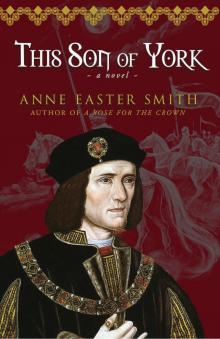 This Son of York
This Son of York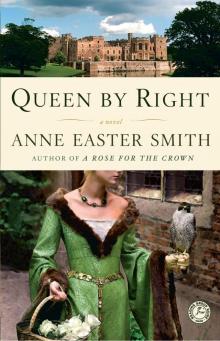 Queen By Right
Queen By Right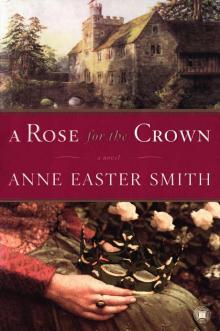 A Rose for the Crown: A Novel
A Rose for the Crown: A Novel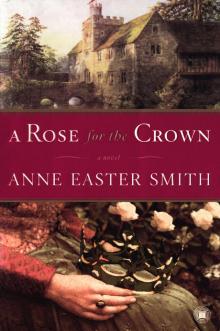 A Rose for the Crown
A Rose for the Crown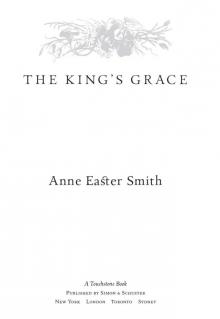 The King's Grace
The King's Grace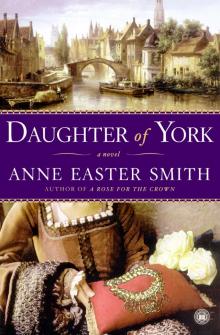 Daughter of York
Daughter of York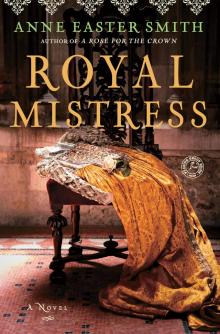 Royal Mistress
Royal Mistress